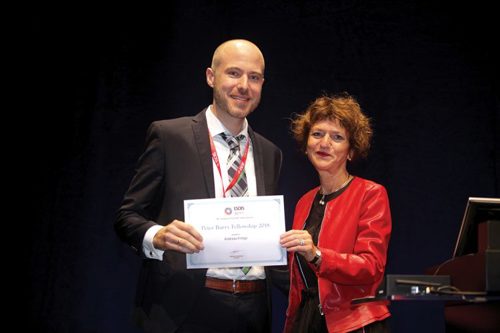2018 Peter Barry Fellowship winner
This Fellowship commemorates the immense contribution made to ophthalmology by former ESCRS president Peter Barry.

Colin Kerr
Published: Friday, December 7, 2018

The winner of this year’s Peter Barry Fellowship is Andreas Frings. Peter Barry was among the pioneers who laid the foundation of the ESCRS and served there for more than 25 years as a board member, treasurer and president. He also had a major role in bringing ESCRS academies around the world. The Fellowship of €60,000 is to allow a trainee to work at a centre of excellence for clinical experience or research in cataract and refractive surgery, for one year, anywhere in the world. Dr Frings studied medicine at medical schools in Hamburg, Germany, and Graz, Austria. He started his training in ophthalmology in 2013 at University Hospital Hamburg, Germany, and finished his training in May 2018 (working at University Hospital Düsseldorf, Germany). He also passed his national exam and EBO exam in May 2018. “Since my MD thesis in 2011, I have been focusing on issues related to cataract and refractive surgery, including topics dealing with biometry, astigmatism treatment and vector analysis, laser refractive surgery and interdisciplinary topics related to corneal biomechanics,” said Dr Frings. He has published more than 50 studies as first, last or co-author and has been involved in more than 100 presentations as first, last or co-author. “I am happy to serve as a supervisor of many younger colleagues and students doing their MD thesis,” said Dr Frings. Dr Frings started his Peter Barry Fellowship in August 2018 at Moorfields Eye Hospital, Refractive Surgery Service, under the supervision of Mr Bruce Allan. His project involves the psychometric evaluation and calibration of a novel patient-reported outcome (PRO) measure for refractive surgery patients developed for use as part of the National Dataset in Refractive Surgery. “We build on existing measures and will use contemporary questionnaire development and validation methodology, including Rasch fitting, to provide a thorough evaluation of the psychometric properties of the new questionnaire,” he said. The development and validation of a concise, practical, online, self-administered, self-archiving and self-scoring PRO questionnaire for routine clinical use in refractive surgery is the primary study objective. Secondary objectives are to gather outcome data from patients before and after surgery in each of the following domains comprising key elements of vision-related quality of life: spectacle dependence; quality of vision; eye comfort; freedom; emotional well-being; and overall satisfaction with the results of surgery. Andreas Frings: andi.frings@gmail.com
Latest Articles
ESCRS Today 2025: Happy Anniversaries!
ESCRS celebrates milestones with pioneers in IOLs, LASIK, femtosecond lasers, and corneal transplantation.
ESCRS Today 2025: A Congress for Everyone
From YOs to families, the ESCRS Annual Meeting embraces full participation through inclusivity.
Beyond the Numbers
Empowering patient participation fosters continuous innovation in cataract surgery.
Thinking Beyond the Surgery Room
Practice management workshop focuses on financial operations and AI business applications.
Aid Cuts Threaten Global Eye Care Progress
USAID closure leads retreat in development assistance.
Supplement: ESCRS Clinical Trends Series: Presbyopia
Debate: FS-LASIK or KLEx for Hyperopia?
FS-LASIK has more of a track record, but KLEx offers advantages.
Four AI Applications Ready for Practice
Commercial offerings may save time, improve practice and research.
Perioperative Medication Regimens for Cataract Surgery
Randomised controlled clinical trial results provide evidence-based guidance.